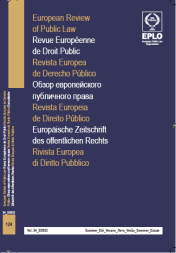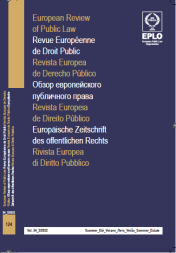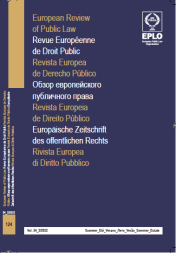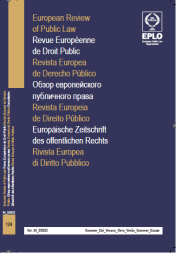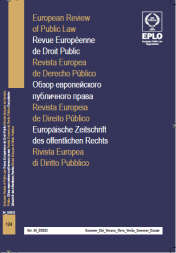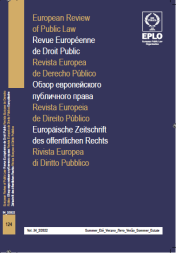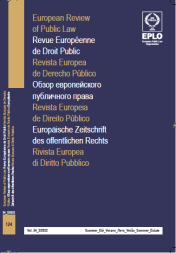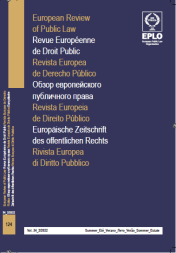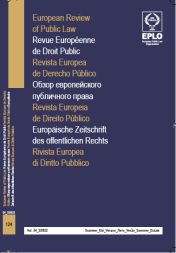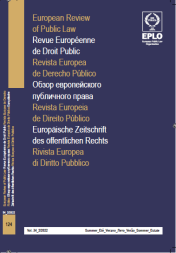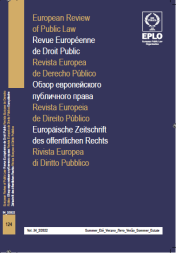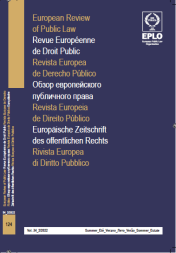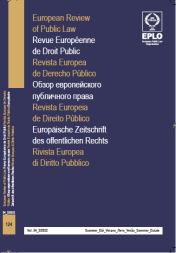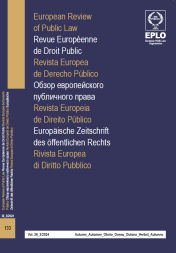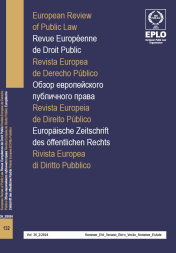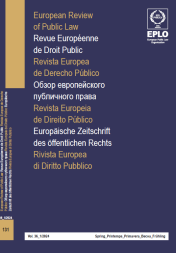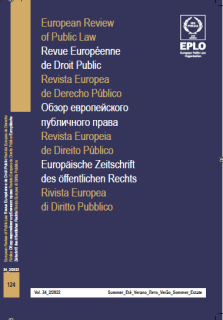
ERPL
Vol. 34, no 2, summer/été 2022 (124)
In this ERPL issue, we have the honor to publish Under-Secretary-General for Legal Affairs and United Nations Legal Counsel Mr. Miguel de Serpa Soares’s speech given at Humboldt University, Berlin, on 17 May 2022. He focuses his remarks on the discourse about the crisis of the United Nations from an international law perspective at a time when the world is facing the most serious global peace and security crisis in decades. In affirming that the United Nations is still relevant and that International Law is also relevant, he raises three questions: Is the United Nations still the core framework “to maintain international peace and security”?; Is the United Nations still the place to defend “the principles of justice and international law”?; and Where are we regarding compliance with international law? The speech is available at the UN website (https://www.un.org/ola/sites/www.un.org.ola/files/documents/2022/05/17052022_mss-speech-humboldt-uni.pdf). It is published in the European Review of Public Law (ERPL) with permission. The Copyright stays with the United Nations.
In the next section of Articles, the first paper aims to examine the characteristics of the offer of essential services in Europe with reference to the procedures for the formation of quality standards and tariffs relating to certain essential services (such as electricity and gas, rail transport and electronic communications) in Italy, France, the United Kingdom and Spain. The research ends with a reflection on the elements that emerged from the comparative analysis, especially under the point of view of distinction between regulation and “political” functions. Comparative research shows that consultation passes from an instrument of “democratisation” of authoritative public power to an instrument for organising economic decisions in liberalised markets (or in markets that are in the process of being liberalised), indispensable for acquiring knowledge and correcting their failures.
The next article argues that the constitutional and legal framework of the Turkish referendum regime fails to satisfy the standards set by common practice in democratic states. For this purpose, in three Sections the paper: first, defines the concept of “authoritarian referendum” and briefly highlights the emerging standards of democratic referendums in comparative constitutional law and international documents; second, explores the constitutional and legal framework of referendum in Turkey and the practice from a historical perspective; and third, analyzes and discusses this legal framework and practice according to the democratic standards of referendums, to conclude that Turkish referendum law and practice do not fit the standards.
In the section of Chronicles, the ERPL is glad to welcome for the second year the representation of Brazil both as concerns Constitutional and Administrative Law.
In the Constitutional Law chronicle coming from Brazil fourteen Constitutional Amendments on different subjects are reviewed, such as fundamental right to data protection and treatment, recognition and maintenance of tax benefits, promotion of women’s political participation, etc. Also, a case about limits to the freedom of speech and debate of parliamentarians is mentioned and the main constitutional fact of the year is recalled: the 2022 general elections, including for President of the Republic, with emphasis on the debate around the fight against fake news.
Next in the section of Constitutional Law chronicles, the chronicle from Cyprus provides a summary of the decision of the Supreme Court of Cyprus to which the President of the Republic of Cyprus referred for its Opinion the question of whether the Rent Control (Temporary Provision) (Amendment) (No. 3) Law of 2020 was contrary to the Constitution. The Court decided that the Law violated the principle of the separation of powers and consequently the Law was declared unconstitutional.
The following chronicle on Constitutional Law, coming from Georgia, maintains that with a view to the establishment of an effective and properly functioning tax system, the mechanisms used by the state to regulate the non-timely fulfilment of tax obligations and reduce its negative impact should be in line with the social and economic challenges facing the country. The security measures envisaged by the Tax Code serve to comply with the requirements of the Constitution regarding the mandatory nature of taxes and create additional guarantees to comply with the requirements of both the Constitution and the Tax Code.
The fourth chronicle on Contitutional Law, coming from Italy, focuses on the actions of the Draghi government, which enjoyed a large parliamentary majority in Parliament after the crisis in the II government led by Giuseppe Conte: the redefinition of the National Recovery and Resilience Plan and fund management procedures, the reformulation of the mass vaccination plan against Covid-19, the reopening of schools, the ecological transition, and economic and labor recovery. Furtthermore, the constitutional reform that reduces the age limit for Senate voters from twenty-five to eighteen and the Constitutional Court Judgments no. 37 and no. 198 of 2021 relating to measures to combat the pandemic are examined.
In the section of Chronicles of Administrative Law, the first chronicle, coming from Brazil, contains an overview of the new federal statutes that have marked administrative law in Brazil in the last 5 years: the amendment that updated the Introduction Law to the Norms of Brazilian Law; the change in the rules on bids and contracts; the new Economic Freedom Act; the amendment that updated the Federal Law of Administrative Procedure; the amendment that updated the Administrative Improbity Law. The chronicle concludes with the evaluation of the aforementioned legislative changes, indicating that, although positive, they are insufficient to face the dysfunctionalities of the Brazilian State.
The second Administrative Law chronicle is concerned with the rulings of the Inquiry Commissions of Tibet I and II concerning the police’s intervention against demonstrations in connection with Chinese state visits. The Commissions ruled that the police had acted “clearly illegally” and that the Danish Ministry of Foreign Affairs have had a very critical role in these events. The reports are interesting from a Danish public law perspective as they lay out certain duties for governmental entities to specify and qualify the conveyance of certain messages between governmental entities.
The following chronicle, coming from France, first examines the intervention of the administrative judge to specify the regime of legality and liability of the COVID-19 vaccination obligation imposed on some professions. The litigation of acts of soft law continues to mature with an increased reference by the court of the effects that such acts can produce with regard to their addressees. Finally, the dialogue between European and national judge has also marked the year 2021.
The chronicle on Constitutional Jurisprudence, coming from France, is devoted to the decisions of the Constitutional Council rendered in 2020 and especially in 2021. These years were marked in particular by the consolidation of the litigation relating to the shared initiative referendum and the preparation of the presidential election by the Constitutional Council, judge of the election. Finally, if the year 2020 marks a decrease both in the a priori and in the a posteriori litigation due to the very particular period of the health crisis, the year 2021 shows on the contrary an increase in these litigations in comparison to the two years preceding it.
This Chronicles section of this ERPL issue concludes with the review of an interesting selection of books coming from Denmark and Italy.
Summary
Under-Secretary-General for Legal Affairs and United Nations Legal Counsel Mr. M. de Serpa Soares, The United Nations: Is It still Relevant? An International Law Perspective [IN ENGLISH] (12 pp.)
A. Benedetti, The Proceduralisation of Public Decisions in Public Utilities: Issues from a Comparative Law Study [IN ENGLISH] (35 pp.)
İ.G. Şen, Referendums in Turkey: Constitutional Framework, Practice, and Their Inconsistency with the Democratic Practices of Referendums [IN ENGLISH] (37 pp.)
Chronicles
I. Constitutional Law
J. Levi Mello do Amaral Júnior, Brazil [IN PORTUGUESE] (9 pp.)
M. Michaelidou-Kyriacou, Cyprus [IN ENGLISH] (6 pp.)
I. Kalandadze, Georgia [IN ENGLISH] (10 pp.)
Ch. Martini / F. Tedde, Italy [IN ITALIAN] (31 pp.)
II. Administrative Law
V. Monteiro / V. Rhein Schirato, Brazil [IN PORTUGUESE] (17 pp.)
M. R. Svendsen, Denmark [IN ENGLISH] (13 pp.)
M. G. Ahlidja, France [IN FRENCH] (34 pp.)
III. Jurisprudence
M. Heitzmann-Patin / M.-O. Peyroux-Sissoko, Constitutional Jurisprudence, France [IN FRENCH] (38 pp.)
Book Reviews
J.E. Rytter / M. Gøtze [IN ENGLISH] (6 pp.)
S. Franca [IN ITALIAN] (14 pp.)















